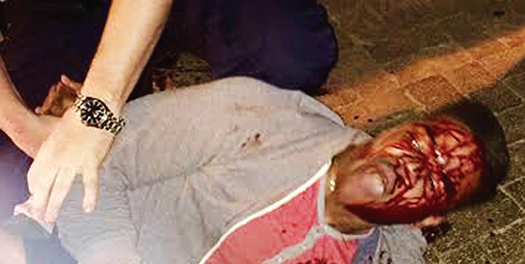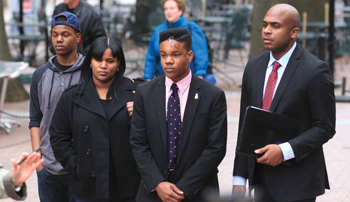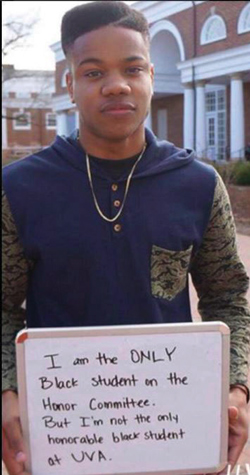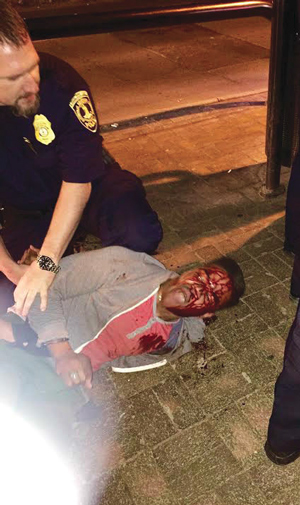When doing the right thing isn't enough
By Charlene Muhammad and Starla Muhammad -Final Call Staffers- | Last updated: Mar 27, 2015 - 3:34:57 PMWhat's your opinion on this article?

|

Martese Johnson is held down by an officer, March 18, in Charlottesville, Va. Court records show that Johnson was charged with obstruction of justice without force and public swearing or intoxication. The Virginia Gov. Terry McAuliffe is calling for an investigation into the arrest of the student. Photo: AP/Wide World photos
|
Martese Johnson’s bloody encounter with officers proves race—not actions, income or education—still defines Black reality, say analysts
(FinalCall.com) - Third-year University of Virginia honor student Martese Johnson survived an alleged assault by a group of Virginia Alcohol Beverage Control officers, but faces a fight for his good name and to avoid a criminal conviction.

Lawyer Daniel Watkins, right, stands with student Martese Johnson, center, his mother Dychea and his brother Michael, left, before making a statement at a press conference March 19, on the downtown mall in Charlottesville, Va. Johnson was bloodied during an arrest March 18 about 1 a.m. by State Alcoholic Beverage Control agents outside Trinity Irish Pub near the University of Virginia. Photos: AP/Wide World photos
|
Almost all asked the same question: How could this happen to Martese, clean cut, bright, active and law-abiding?
“As a Black man, a University of Virginia alumni and as someone who has covered discriminatory police violence against Black men and women the last two years, my hands were literally shaking over my laptop as I tried to write about the beating of Martese Johnson,” wrote Jason Johnson, a Hiram College political science professor, in an op-ed published on www.nbcnews.com.
“I kept hearing his scream, ‘I go to UVA You F***s’ as cops knee him in the back, face beaten and bloodied in a public street in front of all of his classmates. It is a nauseating reminder that no amount of education, poise or good behavior can protect a Black person in America. We are all, one cop, one vigilante, one maniac away from being racially victimized regardless of what investigations come afterwards,” he observed.
“College is a microcosm of the real world, sometimes education, being refined, being respectable, does not shield you from racism. We as persons of color who work with college students have to prepare our students for the harsh reality life, that no matter who you are, what you wear, what you do, you can still be a victim of racism,” said David Julius Ford, Ph.D., who is on the faculty of James Madison University, in Harrisonburg, Va.
Dr. Ford was driven to pursue his doctorate by a desire to work with Black male students, who face challenges in higher education and need support. He has done academic, personal and other counseling with students and knew Martese from speaking at a fraternity banquet at the University of Virginia.

Martese Johnson
|
Faculty members have to use their curriculums to show what is happening and validate what students feel, “to listen and empathize with them,” he said.
“A lot of professionals, no matter what ethnicity of the person—Black, White, Latino, Asian or whatever—I think we are losing that level of empathy for African American male students and therefore we are losing them,” said Dr. Ford.
Helping students begins with empathy, offering a sense of belonging, taking an interest, figuring out what motivates the student, their aspirations and their history along with a sense of openness, he explained. Dr. Ford covered such topics in his dissertation, “A Grounded Theory of the College Experience of African American Males and Black Greek Letter Organizations.” His doctorate is in counseling education and supervision from Old Dominion University.
University of Virginia Alumni for Change has launched a campaign to support Martese and help with his legal and medical expenses. Their Indiegogo page “Justice for Martese” has raised just over $10,000 at Final Call presstime. The page had been up about four days March 23 and the funding goal is $50,000. The effort is mainly led by graduates of the University of Virginia who are members of Kappa Alpha Psi fraternity. Martese is a member of Kappa Alpha Psi.
He was arrested March 18 and police claims he tried to enter the Trinity Irish Pub on the Corner with a fake ID, but the allegations are completely false, his attorney Daniel Watkins said in a media statement.
Martese presented a valid Illinois state ID card, but when he could not state the zip code on the card, but his mother’s current zip code, he was denied entrance. Police claimed he was belligerent, agitated, and appeared to be drunk, but according to the bar’s owner, Martese was courteous, respectable, and didn’t appear to be drunk at all.
The videotaped arrest of the young college student, face bloodied, subdued by three officers, went viral and again sparked outrage and calls for police reform across the country. He required 10 stitches as a result of his head slamming against the pavement.
A model young man
Martese is an upstanding young man with a bright future, said his attorney. He grew up on the South Side of Chicago, was raised by a single mother, and is at the University of Virginia on a full scholarship based on financial need, he said.
“He has worked hard to become a well-respected leader on campus and to make a difference in this community. Martese is a member of the UVA Honor Committee and has no criminal record whatsoever,” Atty. Watkins told reporters. We intend to fight criminal charges against Martese with the utmost vigor, ensure he receives due process and protect his good name, said the attorney.
While many don’t want to choose which Black youth should be protected, there are those who say the injustice against Martese is so blatant it must be condemned. If young men who do the right thing aren’t protected and supported by their community, why should they bother to try to do the right thing at all? they ask.
Frank M. Gore is executive director of the Kappa Leadership Institute headquartered in Chicago. The program mentors young, Black males, cultivating leadership skills, encouraging youth to focus on education and developing youth as community role models.
Martese was part of the program from 2009-2012, Mr. Gore told The Final Call. The type of qualities and characteristics Martese exhibits on the campus of UVA are the exact traits shown as a high schooler in the Kappa program, Mr. Gore said.
“He was an honor student. He was a student all about commitment to making the right decisions,” said Mr. Gore.
Like many who know Martese, Mr. Gore was outraged at the bloody aftermath of the college student’s encounter with ABC officers.
The Kappa Leadership Institute works diligently to mold and motivate young, Black men, many from challenging backgrounds, to choose a positive direction in life, he said.
“This is where you get outraged in that you work so hard to teach these young men from childbirth on to trust in our law enforcement system, to trust in our legal system and trust in those that they look at as authority figures and you have incidents, not just this one but those in the past, which begs to differ everything we teach them to do,” said Mr. Gore.

Martese Johnson is held down by an officer, March 18, in Charlottesville, Va. Court records show that Johnson was charged with obstruction of justice without force and public swearing or intoxication. The Virginia Gov. Terry McAuliffe is calling for an investigation into the arrest of the student. Photo: AP/Wide World photos
|
“I feel that it undermines everything that I’ve been teaching. And you have to go back and try to reinvigorate these young men to continue to strive and move forward despite what they see happening.”
Martese is an initiate of the Eta Sigma Chapter of Kappa Alpha Psi at the University of Virginia.
Politics of respectability
“Black people unfortunately are also advocates in many ways of this whole politics of respectability. Many of us think that if the pants were sagging, that we deserve disparate treatment,” said Salim Muwakkil of WVON-AM Black talk radio in Chicago and senior editor for In These Times.
He has heard many refer to Trayvon Martin, a Black unarmed teen shot to death in Sanford, Fla., in terms his killer George Zimmerman may have used. “I’ve heard that in the Black community. I’ve heard that on my radio show, you know. People have called and had similar kinds of condemnations of Black youth that you hear among White people,” Mr. Muwakkil told The Final Call.
What happened to Martese should help Blacks understand it doesn’t matter if a person’s pants are sagging or not, he said. “Pulling your pants up is not going to change White supremacy. That really has no effect on White supremacy.”
There’s simply a double standard when it comes to policing Blacks and Whites in America, anti-police brutality activists said.
Take the case of White Arizona gunman Ryan Giroux, for instance: According to reports, the 41-year-old, reputed White supremacist went on a shooting spree in a string of crimes on March 18. He allegedly killed one person, injured five others, and waged a standoff with police.
Yet, he was arrested as opposed to shot and killed, like so many unarmed Black men, women, or children.
The problem is racism, White supremacy and the reality that White cops fear genetic annihilation, said Dr. Frances Cress Welsing, a respected psychiatrist and author of “The Isis Papers: The Keys to the Colors.” She writes and lectures about the White supremacy dynamic, White fears that lead to their actions and racial oppression.
“It doesn’t matter whether it’s Trayvon Martin or Emmett Till. It doesn’t matter what the age is,” she said. All of this is happening in a so-called post-racial era with more Black men with White women than ever and Whites responding consciously and subconsciously to the ability of Blacks to breed the White race off the planet, Dr. Welsing explained.
“The police officers are just the first line of defense for the system. They’re not operating on their own. It’s not a question of they need training. See you don’t have a history of Black police officers killing White people, none at all,” she observed.
It’s not to say Black police officers have better eyesight, they just aren’t fearful of their genetic annihilation, Dr. Welsing said. “When they say ‘I thought he had a weapon,’ the Black man doesn’t have a gun. He just has powerful genetic material,” she added.
Armed with Blackness
Martese “was armed with blackness, which is really the common denominator of it all,” said Mr. Muwakkil. Maintaining the country’s racial hierarchy is in the DNA of American policing and more police brutality and public exposure of brutality is coming, he predicted.
Law enforcement sees Black youth as the enemy, the popular radio host said.
“Generally, police are more apt to target people they can identify as members of a certain class, such as people wearing sagging pants, and that always tends to indicate to the police that these people are more dispensable or easily forgotten or not that well thought of because they come from lower income groups, so I can imagine why people might have thought that (Martese is) immune from that kind of judgment, and then to a certain extent he is,” Mr. Muwakkil continued.
“That’s why this is a bit exceptional because as is pointed out, he’s kind of squeaky clean and generally, police are less apt to exercise that kind of biased behavior on someone who may be able to respond in an effective way. Someone who has the wherewithal to respond effectively to police in a legal way,” he said.
The bottom line, according to Dr. Welsing, is White genetic survival in the minds of powers that be and police necessitate killing Black men.
“They just had a lynching of a Black man in Mississippi. At the fraternity in Oklahoma, these young White males talking about lynching a Black man, and I say further that it’s all tied to the House of Representatives and the Senate disrespecting President Obama,” she said.
“They’re saying in other words, ‘n----r,’ you’re not going to tell us what to do. You are not going to be in charge of us.’ And then they invite (Benjamin) Netanyahu (re-elected Israeli prime minister), and he joins them. ‘We don’t have to respect this Black man.’ So if the Congress doesn’t have to respect the Black man, and the Supreme Court in its ruling doesn’t have to respect Black people, then it’s open season,” Dr. Welsing said.
Coded race war
Khari Enaharo, author of “Race Code War, The Power of Words, Images And Symbols on The Black Psyche,” told The Final Call police beatings and killings across the country are based on deception and a battle over codes. The entire system is racist, but the problem is some Whites want to come out of code and some want to stay in, he said.
“That’s why if you hear somebody like at the University of Oklahoma, that chant they (SAE fraternity members) had, if you notice, most of the people who might be White supremacists, what they said was, ‘Oh! These guys are dumb. These guys are stupid. That’s just ridiculous,’ ” Mr. Enaharo noted.
“They never said it was unjust. They never said these guys were racist! They accused them of being stupid. Why? Because they came out of code. All White supremacists are trained from birth to be in code when it comes to racially managing Black people.”
Meanwhile, the Kappa Leadership Institute, which had their weekly meeting with young men the evening of March 18 as the story was breaking, is helping Martese’s peers cope with his ordeal.
This came on the heels of a town hall meeting on the police shooting of Mike Brown, Jr. and protests in Ferguson, Mo. What happened to Martsese prompted a continuation of a dialogue with young men in the Kappa group who see Martese as a respected role model and some to be emulated.
“They were here going ‘once again here we go Mr. Gore you teach us to do this but they do this to us.’ This is where you try to keep regression from happening in the mind of young men who are high achievers, academically doing the things that we tell them to do. How do we keep them on a positive path so they were angry yet listen intently to understand what they can learn from this situation?” he asked.
“Even though we don’t want to think about it, we have to think about every step we take as an African American man. We have to be mindful that everything we do will be scrutinized and can be viewed negatively by those that don’t want to see us progress.”
Mr. Gore said he had a chance to speak with Martese’s mother Dyhea Johnson, the morning of March 20 before she flew out to be with her son. As a mother, she is outraged, he said.
Ms. Johnson, like many Black parents, is tired of seeing children that look like her son brutalized, Mr. Gore said. She’s concerned with Martese’s emotional state because of what he still has to deal with, he added.
“How do you put these young men back on a positive track after he’s experienced something that could put him in a negative whirlwind? Her utmost concern now is we have a 20-year-old young man that’s trying to keep a brave face right now, but I’m sure the moment that he’s in mom’s arms, he’s going to just cry,” Mr. Gore said.
INSIDE STORIES AND REVIEWS
-
-
About Harriett ... and the Negro Hollywood Road Show
By Rabiah Muhammad, Guest Columnist » Full Story -
Skepticism greets Jay-Z, NFL talk of inspiring change
By Bryan 18X Crawford and Richard B. Muhammad The Final Call Newspaper @TheFinalCall » Full Story -
The painful problem of Black girls and suicide
By Charlene Muhammad -National Correspondent- » Full Story -
Exploitation of Innocence - Report: Perceptions, policies hurting Black girls
By Charlene Muhammad -National Correspondent- » Full Story -
Big Ballin: Big ideas fuel a father’s Big Baller Brand and brash business sense
By Bryan Crawford -Contributing Writer- » Full Story






 Click Here Stay Connected!
Click Here Stay Connected!








